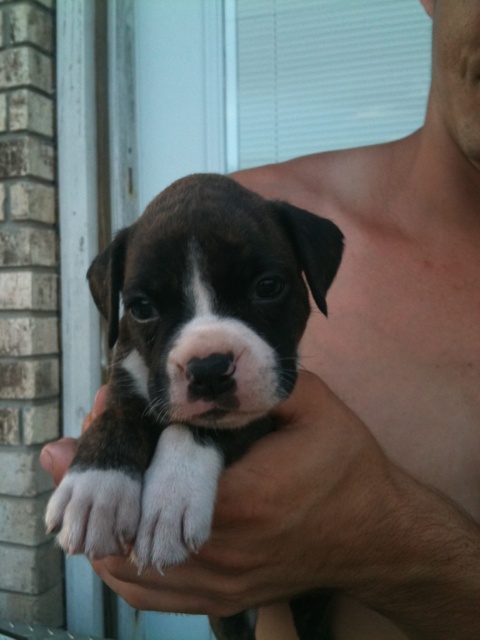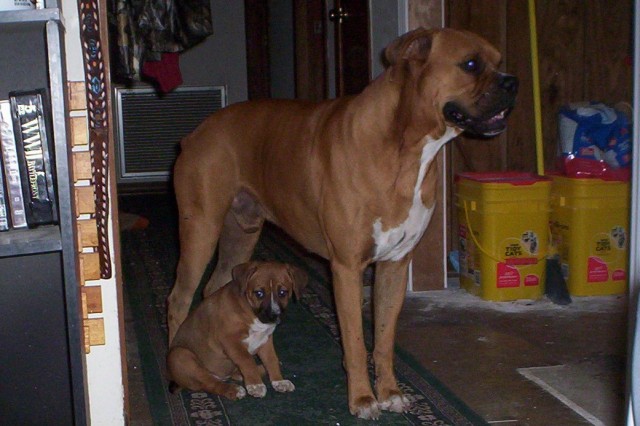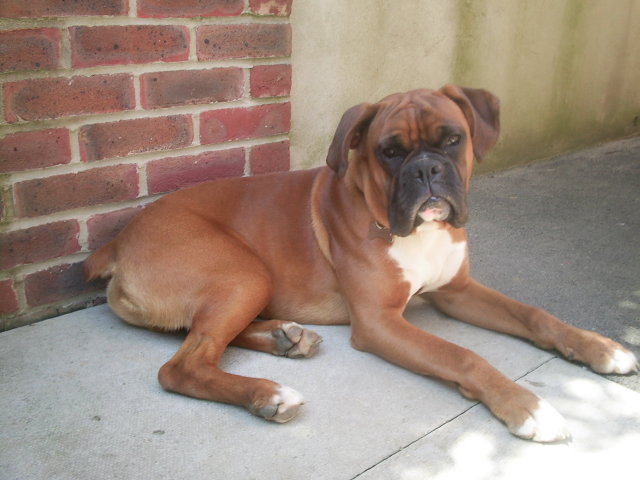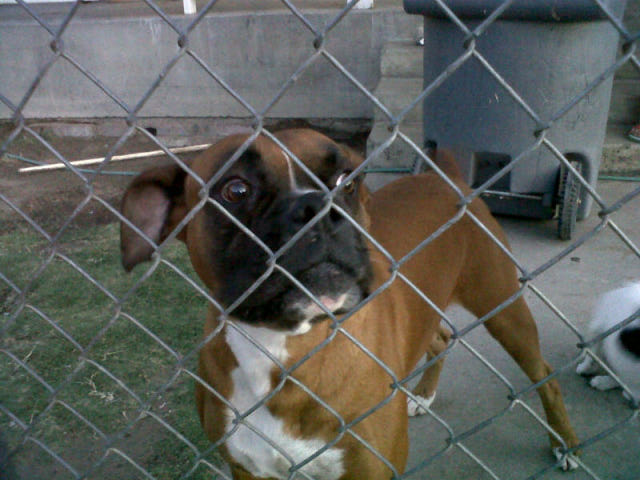QuestionI there. We have a 6 month old boxer who started out being very easy to train and was basically well behaved. Then a couple of months ago he started going potty in the house. He had done that a few times since we got him, but for the most part he was good about it. Then he started doing it everyday! There were times when he would be standing IN FRONT OF THE DOOR and look up at me and pee right there!
NOTHING we have done has worked! We tried showing him his "mess" and then telling him in a firm voice "NO" and then putting him outside. We tried showing him his "mess", telling him "NO" and putting him in a kennel. And we have even tried spanking him when he does it and then crating him or putting him outside.
We moved a couple of weeks ago and thought that being away from the old house and away from the odor that he may still have been picking up would help. For the first week he did great! Even went to the door to go outside. But now he is back to his old ways and even worse! Before he would go in 1 or 2 certain spots in the house. NOW he goes ALL OVER the house and it is to the point where it's 2 or 3 times in a day and even in the middle of the night!
We are so desperate! He also has a few other bad behaviors such as constant barking if he is left alone (which makes it hard to crate train him) and a tendency toward aggression when he "plays" with my kids.
Please help! We love our Boxer, but are at the point that we are ready to get rid of him if this doesn't stop!
Answer6 months old is still quite the baby. So keep this in mind. He is much equivalent to a 2 year old child.
He learns by association. Sight, sound, taste, feel- routine.
He was house trained, and now he is more frequently doing it in the house, correct?
First I would like to advise taking him to your vet and have him checked. Make sure he does not have a urinary infection that is causing the peeing inside the house. If he has an infection, holding his pee is difficut and next to impossible. Have you ever had a bladder infection? It feels as though you have to pee all the time, so let's rule out an urinary infection.
6 month olds and younger will have accidents inside. An adult dog can hold their bladder contents 8 hours- although I do not recommend allowing that to happen-- and a puppy can hold it much less, probably no more than 2-3 hours before he will HAVE to pee whether he wants to or not.
~~~~~~~~~~~~~~~~~~~~~~~~~~~~~~~~~~~~~~~~~~~~~~~~~~~~~~~~~~~~~~~~~~~~~~
Moving is a trauma for any age- especially a puppy. He hasn't known any place but "home." He had all the familiar scents of himself and the family there through his early development and represented "security."
Now he is in a new house- and it is like a big unknown, unfamiliar world. Imagine being stranded alone in another country with no knowledge of their traditions, language, customs, etc. This is what he is experiencing. He is in this "world" with no familiar scents, feels, sights, and tastes. It is a foreign country to him.
I believe there are 3 things going on here and maybe more.
It is unfortunate it has a domino effect, but that is the world of a puppy learning.
First, the inside accidents (if no urinary infection is present) were his way of marking his territory- his new surroundings- his new home. And there were probably a few times someone forgot to keep up with time and take him outside, so he had to pee.
Once the peeing started, it has become a bad habit- behavioral habit.
It doesn't matter how severely you chastise him- the behavior is set.
BUT--- DO NOT CHASTISE HIM AND SPANK HIM!!! What that gets YOU is a puppy that is terribly afraid to pee outside like he is suppose to. You are actually telling him that "peeing" is bad and he will not want to pee in his designated area= outside. He is associating "peeing" to bad, punishment, and HATE.
You should "reinforce" positives, not negatives.
You do not want him associating punishment with his crate either. When you put him inside his crate for another reason, he will believe he has done something wrong- yet won't know what he did wrong- and soon associated crate to hate and abuse. It only leads to confusion.
So stop that crating and spanking immediately or you will have a severely emotionally and mentally screwed up Boxer. (or any dog)
I am sensing this is your first Boxer. All puppies can and will have accidents "2-3" times a day. This is nothing to be alarmed about, as a child has accidents as you are potty training him and off diapers, training pants, etc. It's gonna happen... so you'll have to accept it and deal with it as you are "potting training a little child."
... so please chill out, as the puppy can sense your state of mind and emotion, and he will either become a nervous anxiety-prone dog and insecure, or aggressive.
You are currently creating both.
He is already insecure as a young pup. He is even more insecure of his new home. Your emotional state over his accidents is making him more insecure. Crating him is an association of bad and causing insecurities which has now manifested a separation anxiety in which you created.
Association to his crate should be good- to be in his crate for short periods while you are gone, and given a treat upon your return- thus creating a good association of crate + family returned + treat. Of course you should them take him outside to pee. Praise him, tell him he is a good boy, love him, cuddle him- shower him with affection and praise. The association will be positive. You will then get positive behavior from him.
He will bark. He is a puppy. He is learning to be vocal and barking is not always a sign of aggression- but a sign of a puppy wanting to play and wanting attention. When a Boxer barks in with aggression- you will know- they will growl and have a very throating bark- not a high-pitched puppy bark that only wants to get those people's attention to play.
And playing rough with your children- you did not state their ages. Are they young and being too rough with him, i.e. pulling his ears, slapping him, throwing him around, etc.? Or are they playing with the puppy normally (being 5 years old and up)and the pup being "aggressive?" I have to ask, what is your definition of "aggressive"?
Boxers play very, extremely aggressively. Mama taught him to be a "big, bad Boxer-boy" at a very young age= 3 weeks old and continually from then on. It's all he has learned.
Biting, tugging, leaping, attacking, growling, barking, are all Boxer playing signs. He is rough. Boxers bite each other's mouths, and locking up when playing. They can stand up and literally box each other with their front paws, thus the given name "Boxer."
Boxer puppies are some of the most rowdy and rough little pups of all breeds and he is doing as his mama taught him. And if daddy was on site, as his daddy taught him as well.
It is up to you to train him to play correctly. You will need to sit on the floor as your children do, and play with him. When he gets rough by biting your arm and holding on, remove him and tell him "no" and in simple terms and commands that it is not acceptable, not alright, but continue playing to let him know it's alright to play but simply in a less-aggressive way with humans.
Soon, the children can use the exact same commands and method to stop his roughness when he gets carried away.
He IS NOT being aggressive toward your children but merely playing the only way he knows how.
Re-potty training him is in order. Start by taking him outside to pee every 1 1/2 hours. Then increase it to every 2 hours. As he grows the length of time can be more.
Take him to the back door and before going out tell him "Outside. Let's go outside. Outside to pee." (or whatever you call it in your family.) Then open the door as you are continually saying that and let him out. Go with him for a few weeks and praise him and shower him with "good job- good boy!" for peeing and pooping outside. Give him a treat. Select a treat that he only gets for being good, i.e. peeing outside, coming home and letting him out of his crate, all training, etc. Pick a different treat (different flavor he doesn't like as much, for a regular treat in between training and stick to the two)
Never scold him. Never use a mad voice. Never yell at him. Never, ever, ever, spank him. Never crate him as punishment. Never think, feel, act, sound mad.
Always use a "stern" monotone voice in reprimands, and only use simple repetitive commands and reprimands consistently without adding to them or taking away from them. Association- he learns by association. The same reprimand for the bad behavior, the same sound and tone and words and result- punishment.
Punishments are difficult for a puppy. You do not want to crate him for a punishment because of the anxiety disorder. Punishment should only be verbal.
For the anxiety: put him in his crate after taking him out to pee and stay out of the house (even if in the yard where he can not see you) for 10 minutes. This is an eternity to a pup. Do this a few times a day. Increase the time by 5-6 minutes every 4 times.
Always come back in, let him out, praise him for being a good boy (whether he barked the entire time or not, you aren''t suppose to have been able to hear him and know he barked) and give him his special treat and take him outside to pee. Shower him with praise and affection. Positive.
Soon he will associate that being in his crate is positive and okay because you and family will come home soon, love him, praise him, be happy, him making you happy- you making him happy, and getting a special treat that he loves. All is happy for everyone.
Positive-- NEVER NEGATIVES. Do not yell at him as you would not yell at your children. He is a fur child.

 9 week old female
Question
Bentlee
Hi my name is Kelsi... My little Bentl
9 week old female
Question
Bentlee
Hi my name is Kelsi... My little Bentl
 new boxer puppy
Questionandre and boots
QUESTION: i have an akc
new boxer puppy
Questionandre and boots
QUESTION: i have an akc
 10 month old boxer shows no signs of testicles
QuestionQUESTION: Hi there, i have a 10 month old boxer
10 month old boxer shows no signs of testicles
QuestionQUESTION: Hi there, i have a 10 month old boxer
 boxer question
Question
MAX CHINA
Are the dogs in the fol
boxer question
Question
MAX CHINA
Are the dogs in the fol
 Boxer Food and Testicles Questions
QuestionAxle - Boxer
QUESTION: Hello! First I wo
Boxer Food and Testicles Questions
QuestionAxle - Boxer
QUESTION: Hello! First I wo